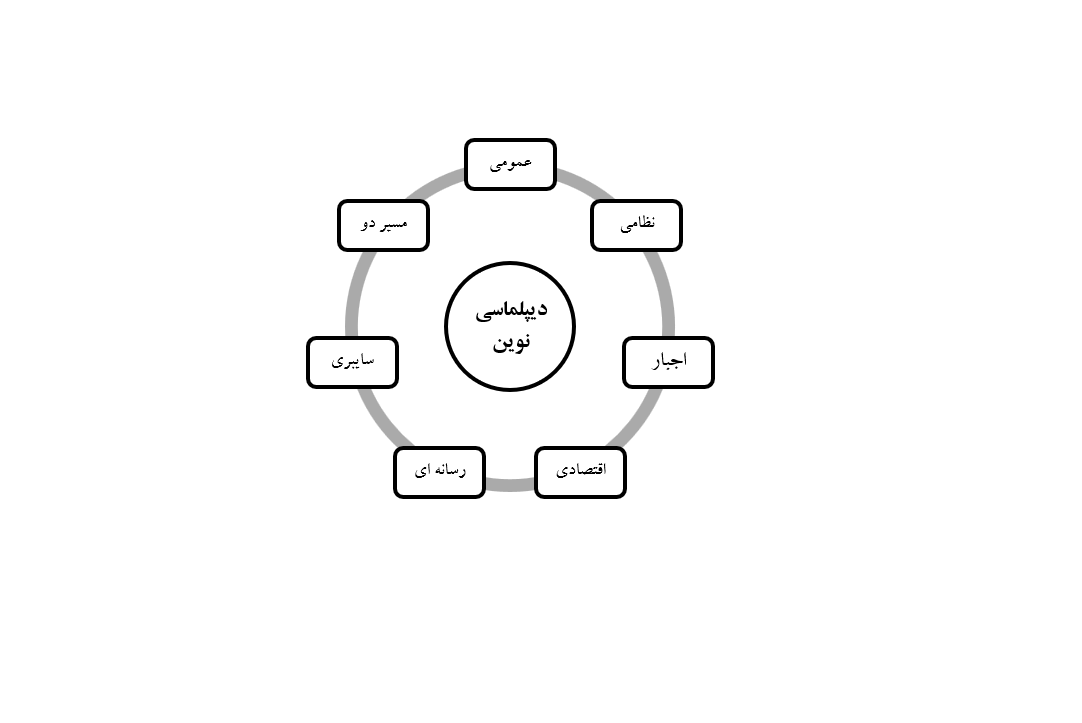The Role of Modern Diplomacy in the United States’ Hybrid War Against the Islamic Republic of Iran (2015–2023)
Keywords:
Iran, United States, hybrid warfare, modern diplomacyAbstract
Over the past four decades, the United States has continuously sought to change the behavior or the governing system of the Islamic Republic of Iran. In recent years, theorists have introduced a new type of conflict known as hybrid warfare, which has become the core strategic approach of the United States toward various countries, including Iran. One of the key instruments of this war is modern diplomacy, through which the United States advances its policies toward Iran using various methods such as public, military, coercive, track-two, economic, media, and cyber diplomacy. The central question of this study is: what are the roles, applications, and impacts of the components of modern diplomacy in the U.S. hybrid war against Iran? The hypothesis of this research posits that modern diplomacy, as one of the main tools of the U.S. hybrid warfare against Iran, plays a significant role in achieving the United States’ strategic objectives. This diplomacy seeks to influence public opinion, governments, and international organizations through diverse mechanisms in order to secure U.S. interests. The research adopts a descriptive-explanatory method, and the findings indicate that the United States has utilized instruments such as public diplomacy through institutions like the National Iranian American Council (NIAC) and advisory councils, track-two diplomacy with three approaches—conciliation, deterrence, and war—military diplomacy, coercive diplomacy, and cyber diplomacy through platforms such as Twitter and Instagram. These results demonstrate that the U.S. approach in hybrid warfare represents a combination of hard, semi-hard, and soft instruments within the framework of diplomacy.
Downloads
References
Abdollahkhani, A., & Kardan, A. (2011). American Approaches and Plans Regarding Iran. Abrar Moaser Tehran.
Ahangari, A. (2011). Psychological Operation Tools of the U.S. Against the Islamic Republic of Iran. Pouya.
Amini, S. J., & Damirchilu, M. (2019). Opportunities and Threats of the Islamic Republic of Iran's Virtual Diplomacy in the Bipolar Age. Quarterly Journal of Foreign Policy, 33(3), 1-30.
Arquilla, J., & Ronfeldt, D. (2009). The Advent of Netwar (Revisited). In Networks and Netwars: The Future of Terror, Crime, and Militancy.
Asadi, B. (2008). Foreign Policy of the Reformist Government: Successes and Failures. Center for Islamic and Iranian Studies.
Ashna, H. a.-D., & Jafari Haftkhani, N. (2007). Public Diplomacy and Foreign Policy: Links and Objectives. Biannual Journal of Political Science, 3(5), 179-206.
Carpenter, T. G. (2006). Iran's Nuclear Program: America's Policy Options. https://object.cato.org/sites/cato.org/files/pubs/pdf/pa578.pdf
Fitzpatrick, M. (2008). The Iranian Nuclear Crisis: Avoiding Worst-Case Outcomes. http://www.iiss.org/en/publications/adelphi/by%20year/2008-e03b/the-iranian-nuclear-crisis-avoiding-worst-case-outcomes-cb9e
Ghanbari Salhashur, M. R. (2018). Soft War Against Countries Opposing U.S. Hegemony. Strategic Studies of the Islamic Revolution, 1(3), 1-40.
Gilboa, E. (2002). Global Communication and Foreign Policy. Journal of Communication. http://dw.com/p/11uvN
Golshan Pajouh, M. R. (2011). Soft War 6. Abrar Moaser Tehran.
Hatami Rad, M. (2007). Media War. Quarterly Journal of Payam(85), 200-211.
Joneidi, R. (2011). Methods of Psychological Operations of the Western Media System Against the Islamic World. Arm.
Karimi Fard, H., & Labkhand, E. (2017). The Role of Think Tanks in U.S. Foreign Policy Towards Iran. Political Research of the Islamic World, 6(1), 55-81.
Mousavian, S. H. (2015). Iran and America: A Failed Past and the Path to Reconciliation. Tisa.
Movahedian, E. (2016). Study the Impact of Cyber Diplomacy of the U.S. on the Perspectives of Iranian Users in Cyberspace Allameh Tabatabai University].
Nafiu, R. (2018). The Art of Sanctions: An Inside Look. Research Center of the Islamic Consultative Assembly.
Nixon Center. (2004). The United States and Iran: The Nuclear Puzzle. Abrar Moaser Tehran.
Omidy, A. (2017). The U.S. and Coercive Diplomacy Against the Nuclear Program of the Islamic Republic of Iran. Year 16(57), 111-134.
Pompeo, M. (2018). After the Deal: A New Iran Strategy. The Heritage Foundation. https://www.heritage.org/defense/event/after-the-deal-new-iran-strategy
Ranjbaran, D. (2009). Soft War. Sahel Andisheh.
Ranjkash, M. J. (2021). The Nature and Characteristics of U.S. Public Diplomacy Towards Iran. Strategic Cultural Studies, 1(1), 131-152.
Shiroudi, M. (2006). Hybrid Wars. Nashr Ni.
Tabatabai, S. M., & Asmani, H. (2020). Military Diplomacy: A New Strategy of States in Pursuing Foreign Policy Goals. Quarterly Journal of Government Studies, 6(23), 219-256.
Toofan, M. (2017). The Role and Capacity of Virtual Embassies in Modern Diplomacy. Quarterly Journal of Media, 27(2), 124-138.
Trump. (2019). Iran Can Be a Great Country with These Leaders. https://www.bbc.com/persian/iran-48422131
Wilson, E. J. (2008). Hard Power, Soft Power, Smart Power. The Annals of the American Academy of Political and Social Science, 110-124. https://doi.org/10.1177/0002716207312618
Yazdanfam, M. (2014). Public Diplomacy of the Islamic Republic of Iran. Strategic Studies Research Institute.
Ziaei Parvar, H. (2008). Soft War 2. Abrar Moaser Tehran.

Downloads
Published
Submitted
Revised
Accepted
Issue
Section
License
Copyright (c) 2025 Mojtaba Chenari (Author); Hossein Karimifard (Corresponding Author); Feredoun Akbarzadeh , Shahram Fattahi (Author)

This work is licensed under a Creative Commons Attribution-NonCommercial 4.0 International License.







